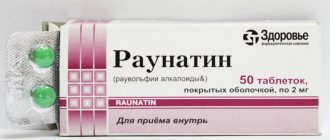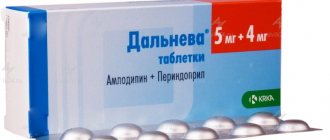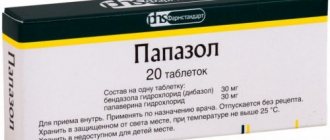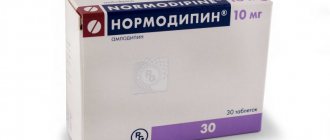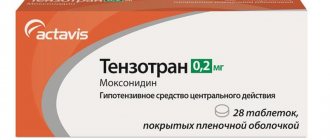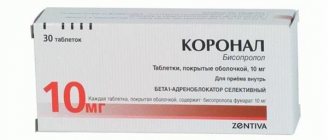pharmachologic effect
Atenolol blocks nerve impulses, which leads to a decrease in the frequency and strength of heart contractions. Atenolol has hypotensive (reduces blood pressure), antianginal (eliminates symptoms of myocardial ischemia) and antiarrhythmic (eliminates heart rhythm disturbances) effects.
During the first day after oral administration of Atenolol, a reactive increase in total peripheral vascular resistance is observed against the background of a decrease in cardiac output. The severity of this action begins to decrease within 1-3 days. The hypotensive effect of Atenolol manifests itself in the form of a decrease in minute and stroke volume, a decrease in systolic (highest) and diastolic (lowest) blood pressure.
Reviews of Atenolol indicate that the hypotensive effect of the drug lasts 24 hours, and in case of regular use, by the end of the second week the results stabilize. The antianginal effect of Atenolol is aimed at reducing the myocardial oxygen demand by reducing the number of heart contractions. Clinical studies and reviews of Atenolol confirm that the drug reduces mortality among patients who have had myocardial infarction by reducing the frequency of angina attacks and ventricular arrhythmias.
About 50% of the drug dose is absorbed from the gastrointestinal tract after oral administration of Atenolol. Binding to blood proteins – 6-16%. The therapeutic effect of Atenolol can be observed 2-4 hours after oral administration; this effect lasts about a day. It is practically not metabolized in the liver. Atenolol is excreted by the kidneys and during hemodialysis. The drug penetrates into breast milk and through the placental and blood-brain barriers in small quantities.
Release form and composition
The drug is available in the form of tablets that contain:
- 25, 50 or 100 mg atenolol;
- The following excipients: lactose, hydroxypropyl methylcellulose, sodium starch glycolate, corn starch, polyvinylpyrrolidone, isopropanol, sodium lauryl sulfate, magnesium stearate, purified talc, titanium dioxide, polyethylene glycol, colloidal silicon dioxide, purified water and sunset yellow dye.
Atenolol tablets are sold in 10 pcs. in cellular contour packages.
Indications for use of Atenolol
Prescribing the drug is advisable for:
- coronary heart disease;
- hypertension and arterial hypertension;
- unstable angina, angina at rest, angina on exertion;
- hyperkinetic cardiac syndrome, decreased muscle tone at the mitral valve;
- neurocirculatory disorders with hypertensive complications;
- essential tremor, senile tremor and tremor accompanying withdrawal syndrome.
According to the instructions, Atenolol can be used for the prevention and treatment of diseases such as:
- myocardial infarction;
- arrhythmias of various etiologies;
- paroxysmal atrial tachycardia, sinus tachycardia, supraventricular and ventricular extrasystoles;
- atrial flutter.
Positive reviews of Atenolol confirm its effectiveness in the complex treatment of hypertrophic obstructive cardiomyopathy and thyrotoxicosis.
special instructions
Taking the drug should be accompanied by regular measurement of blood pressure, pulse, and sugar levels in people with diabetes .
Elderly patients are advised to periodically monitor the condition of the renal system. The doctor needs to instruct the patient and teach him how to measure heart rate correctly. In 20% of patients with angina, adrenergic blockers do not provide the desired effect due to severe coronary atherosclerosis with a low ischemic threshold and impaired subendocardial blood flow .
In patients with nicotine addiction, the effectiveness of Atenolol is significantly lower than in patients who do not smoke. During therapy, there may be a decrease in the production of tear fluid, which should be warned about in patients who wear contact lenses.
The drug may mask the clinical picture of thyrotoxicosis (tachycardia). Abrupt withdrawal of the drug in patients with thyrotoxicosis is unacceptable due to the risk of increasing the severity of the symptoms of the disease. Atenolol is able to mask tachycardia during hypoglycemia. The medication is discontinued several days before the planned general anesthesia with ether or chloroform. Otherwise, the patient is selected a drug for general anesthesia, which has minimal inotropic effects.
Intravenous administration of atropine eliminates reciprocal activation of the vagus nerve. The drug can be prescribed to patients with bronchospastic pathology if other antihypertensive drugs are ineffective or intolerant, subject to strict adherence to the dosage regimen.
If elderly people develop arterial hypotension, increasing bradycardia, ventricular arrhythmia, bronchospasm, severe disorders of the liver and kidneys, the dosage of the drug is reduced or therapy is stopped completely. If depression develops, the drug is replaced. Abrupt withdrawal can cause myocardial infarction, a severe form of arrhythmia. The drug is discontinued by gradually reducing the dosage over two weeks.
Before determining the level of normetanephrine, catecholamines, antinuclear body titers, and vanillylmandelic acid, Atenolol is discontinued. The medication affects the control of vehicles.
Recipe in Latin:
Rp: Atenololi 0.05 D. td N 30 in tab. S. 1 tablet 1 time per day.
Side effects
Reviews of Atenolol rarely mention side effects, but it should be borne in mind that the body may react to the use of the drug as follows:
- memory impairment, decreased concentration, increased fatigue, weakness, dizziness;
- depression, hallucinations, anxiety, tremors, convulsions;
- impaired visual function, decreased activity of the exocrine glands;
- heart failure, arrhythmia, bradycardia, hypotension, atrioventricular block, agranulocytosis, thrombocytopenia, chest pain;
- nausea, vomiting, dry mouth, stool disorders, epigastric pain, liver dysfunction;
- laryngospasm, bronchospasm, shortness of breath;
- allergic reactions on the skin;
- impotence, decreased libido, changes in the activity of certain enzymes, decreased body temperature in the extremities, increased levels of bilirubin in the blood.
The use of Atenolol must be discontinued gradually to prevent complications, since this drug is characterized by a withdrawal syndrome. It should be taken into account that the higher the therapeutic dose, the more frequent and severe the side effects. As evidenced by reviews of Atenolol, a mild negative reaction of the body to the drug goes away after 2-3 weeks of regular use.
Overdose
Manifested by bronchospasm , cyanosis of the nail plates, convulsions , difficulty breathing, arrhythmia, fainting, drop in blood pressure, dizziness, severe bradycardia.
Emergency gastric lavage is required.
In case of atrioventricular conduction disturbance or bradycardia, atropine, epinephrine is administered intravenously, or a temporary pacemaker is installed.
If there is a sharp drop in blood pressure, the patient is placed in the Trendelenburg position .
In the absence of signs of pulmonary edema, plasma-substituting solutions are administered intravenously; in case of ineffectiveness, dobutamine , epinephrine, and dopamine are administered.
For convulsive syndrome, intravenous infusion of diazepam is indicated. Dialysis is effective.
Contraindications to the use of Atenolol
The instructions for Atenolol indicate diseases for which the use of this drug is prohibited, these include:
- cardiogenic shock;
- sinus bradycardia;
- atrioventricular block of the first and third degree;
- sinuauricular block;
- arterial hypotension;
- acute and chronic heart failure;
- disturbance of the acid-base balance towards acidosis;
- bronchial asthma.
Prescription of Atenolol is contraindicated for persons with hypersensitivity to the components of the drug,
Under the supervision of a physician, Atenolol is used by pregnant and lactating women, children and the elderly, as well as patients with myasthenia gravis, psoriasis and depression.
Interaction
In patients taking Atenolol, allergen extracts for skin testing, as well as allergens for immunotherapy, significantly increase the risk of developing severe systemic allergic reactions, anaphylaxis. The risk of anaphylactic reactions increases with intravenous administration of radiocontrast agents.
A fall in blood pressure and cardiodepressive effects have been observed with intravenous infusion of phenytoin, as well as with the use of drugs for inhaled general anesthesia. The drug can mask the signs of developing hypoglycemia with the simultaneous use of oral hypoglycemic agents and insulin.
Atenolol reduces the clearance of xanthines and lidocaine . Estrogens, glucocorticosteroids, NSAIDs, BMCC, guanfacine, reserpine, methyldopa , cardiac glycosides, amiodarone, Diltiazem , Verapamil and many antiarrhythmic medications increase the likelihood of developing atrioventricular block, bradycardia, cardiac arrest, and worsening heart failure.
Hydralazine, sympatholytics, clonidine, diuretics, antihypertensive drugs, BMCC can significantly reduce blood pressure.
Atenolol prolongs the duration of action of coumarins, non-depolarizing muscle relaxants. Neuroleptics, sedatives, hypnotics, ethanol, tetracyclic and tricyclic antidepressants increase the inhibitory effect on the central nervous system.
The simultaneous administration of MAO inhibitors is unacceptable due to the risk of hypotension. Impaired peripheral circulation is observed when using medications with non-hydrogenated ergot alkaloids.
Instructions for use of the drug
Atenolol instructions for use of tablets contain information about the regimen and dosages in which the drug should be taken for certain diseases:
- Atenolol for high blood pressure, heart rhythm disturbances (arrhythmias), tachycardia, angina pectoris, is taken in a dosage of 50 mg per day. On the recommendation of the attending physician, the daily dosage of the drug can be increased to 100 mg.
- In case of disturbances in the functioning of the cardiovascular system, the optimal daily dose of the drug is 25 mg.
For patients suffering from impaired renal function, the medicine is prescribed in lower dosages. The optimal safe dose is determined by a medical specialist, based on the symptoms present and the severity of renal failure.
Atenolol blood pressure tablets are taken whole (without chewing or crushing) before meals, washed down with plenty of water (at least one glass).
Some patients prefer to place an Atenolol tablet under the tongue, like Nitroglycerin. However, doctors do not advise doing this, since the effectiveness of the drug does not increase, but the risks of possible adverse reactions increase significantly!
The optimal duration of the therapeutic course is determined by the doctor individually, taking into account the exact diagnosis and other features of a particular clinical case!
Only a doctor can figure out whether taking Atenolol is necessary in each specific case
Pharmacodynamics: effect on blood pressure
The mechanism of action of the drug Atenolol is based on the ability of the active ingredients of the drug to block β-receptors, suppressing the influence of stress factors on the patient’s internal organs and systems.
Atenolol for high blood pressure is characterized by the presence of the following pharmacological properties:
- slowing heart rate;
- normalization of blood pressure indicators;
- reducing the risk of developing heart rhythm disturbances, potentially life-threatening for the patient.
Atenolol is an effective inhibitor of vasomotor centers, as well as the release of renin from the renal apparatus. It has the ability to powerfully counteract cardiac β-receptors, significantly reducing cardiac output.
Atenolol price, where to buy
Price Atenolol 25 mg, 30 tablets - 17 rubles.
50 mg, 30 pieces - 21 rubles.
- Online pharmacies in RussiaRussia
- Online pharmacies in UkraineUkraine
- Online pharmacies in KazakhstanKazakhstan
ZdravCity
- Atenolol tablets 100 mg 30 pcs. AO Update PFK
39 rub. order - Atenolol tablets 50 mg 30 pcs. AO Update PFC
39 RUR order
- Atenolol tab. 50mg n30Pliva
58 RUR order
Pharmacy Dialogue
- Atenolol tablets 50 mg No. 30Ozon LLC
23 RUR order
- Atenolol tablets 100 mg No. 30Update PFK ZAO
44 RUR order
- Atenolol tablets 50 mg No. 30Update PFK ZAO
47 RUR order
show more
Pharmacy24
- Atenolol-Zdorovye 0.05 g No. 20 tablets TOV" Pharmaceutical company "Zdorovya", Kharkiv, Ukraine
9 UAH. order - Atenolol-Astrapharm 50 mg No. 20 tablets TOV Astrapharm, Ukraine
7 UAH order
- Atenolol-Astrapharm 100 mg No. 20 tablets TOV Astrapharm, Ukraine
11 UAH order
- Atenolol 50 mg No. 20 tablets PAT Monpharm, Ukraine
8 UAH order
PaniPharmacy
- ATENOLOL tablets Atenolol tablets 50 mg No. 20 Ukraine, Astrapharm LLC
8 UAH order
- ATENOLOL tablets Atenolol tablets 100 mg No. 20 Ukraine, Astrapharm LLC
12 UAH order
- ATENOLOL tablets Atenolol tablets 50 mg No. 20 Ukraine, Monfarm JSC
9 UAH order
- ATENOLOL tablets Atenolol tablets 50 mg No. 20 Ukraine, Health LLC
11 UAH order
show more
Interaction with other drugs and alcohol
It is not recommended to combine Atenolol tablets with barbiturates and diuretics, since these drugs increase the effect of the drug on blood pressure.
The combination of Atenolol with calcium antagonists can cause a hypotensive crisis and heart failure.
The use of these tablets with hypoglycemic drugs enhances the effect of Atenolol, which can provoke possible adverse reactions.
The combination with adrenaline and norepinephrine leads to a sharp increase in blood pressure.
Combination with anti-inflammatory drugs weakens the effect of Atenolol tablets and its ability to influence blood pressure.
The drug Atenolol is not compatible with alcohol! The simultaneous use of tablets with alcoholic drinks leads to a decrease in the ability to concentrate and reaction speed.
Atenolol is incompatible with alcohol
Analogs
Pharmacy chains offer the following analogs of Atenolol:
- Bisoprolol;
- Metoprolol;
- Concor.
It should be noted that although these medications help reduce blood pressure, they have their own characteristics, contraindications and side effects. Therefore, before replacing Atenolol with another drug, you must consult your doctor!
Atenolol tablets are an effective fast-acting remedy that helps normalize blood pressure, pulse and heart rate. However, the drug has a fairly wide range of contraindications and can provoke unwanted reactions if used incorrectly. Therefore, before starting a therapeutic course, it is strongly recommended to consult a specialist!
Reception features
Doctors strongly advise people with certain health problems to pay attention to the peculiarities of taking Atenolol:
- For psoriasis, taking pills can trigger a relapse of the disease.
- In patients suffering from angina, treatment with Atenolol may lead to an increase in the number of attacks;
- In case of ischemic disease, do not abruptly stop taking the drug. Patients in this category are recommended to smoothly and gradually reduce the daily dose of tablets.
- During therapy with Atenolol, the development of thyrotoxicosis can be missed, since this drug hides the symptoms characteristic of this pathology.
- With diagnosed myasthenia gravis, there is a possibility of deterioration of the patient’s general condition and exacerbation of clinical signs of the disease.
- For hypoglycemia in people with diabetes, the tablets may affect the heart rate.
For depressive conditions and nervous disorders, therapy with Atenolol should be carried out under the supervision and strict supervision of a qualified specialist!
For a number of diseases, taking Atenolol has its own peculiarities; you should consult your doctor
Use during pregnancy and lactation
Atenolol is approved for use during pregnancy, but the patient’s treatment must be under strict medical supervision.
The active ingredients of the drug penetrate the placenta into the fetus. Due to the lack of sufficient information about the effect of Atenolol tablets on the formation of organs and systems of the unborn baby, this medicine is not recommended for use during the first trimester of pregnancy.
During pregnancy, Atenolol is used only if absolutely necessary.
Further therapy is carried out under the supervision of medical specialists. Taking the drug must be stopped no later than 2 days before the expected day of birth. Otherwise, the likelihood of the following unwanted complications in the newborn increases:
- Hypoglycemia;
- Bradycardia;
- Respiratory dysfunction;
- Hypotension (low blood pressure).
Young mothers should be aware that the active ingredients of Atenolol have the ability to pass into breast milk. The use of these blood pressure pills during lactation can negatively affect the baby’s health, causing the following problems:
- Hypoglycemia;
- Bradycardia;
- A sharp decrease in blood pressure.
For this reason, during treatment with Atenolol, it is recommended to temporarily transfer the baby to artificial feeding.
